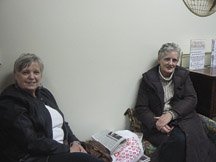With the health care reform bill approved by the legislature last week, many Americans – including Secaucus residents – are trying to figure out what it will mean for them, and when.
The sweeping legislation will be phased in over time, and some of its elements will not go into effect until 2014 or 2016. But it will eventually extend health coverage to 32 million Americans who are currently uninsured.
While critics call it too expensive to fund, the legislation, signed into law by President Obama, tries to rein in soaring health care costs for small businesses, the unemployed, part-time workers, senior citizens, and the poor.
“She’s been worried no one would cover her, because of the cancer.” – Diane Scott
________
“I love my president. I hope it’s going to help me,” said resident Patti Sitty, who said she’s currently unemployed and doesn’t have health insurance.
By 2014, people who are unemployed will have the option of purchasing health insurance through a health exchange, which is supposed to offer low-cost health coverage. These health exchanges will also be available to people who are self-employed, workers who don’t get insurance from their employers, and laid-off workers who cannot afford COBRA.
Beginning in 2016, Americans who refuse to have some form of health care can be fined – which critics have called unconstitutional – although there will be exemptions for those who can’t afford the plans offered on the market. (People won’t be required to carry insurance, for example, if the cheapest plans offered are more than eight percent of their income. Single individuals who earn less than $9,350 would also be exempt, as would couples earning less than $18,700.)
“I think it’s great,” Sitty said, referring to passage of the law.
Allison Petrone said she also supported the legislation and was happy to see it passed after many years of debate.
“It seems like a good thing,” she said Wednesday afternoon outside Marra’s drug store. “I’m covered by my company right now. So I really don’t know how much it’s going to affect me. But I think it’s a positive thing. Presidents gave been trying to do this for so long. I think we need it in this country.”
Supporters of the law claim everyone, including people who already have coverage, will benefit from a provision that prohibits insurers from dropping people when they become sick or refusing coverage to people with pre-existing conditions.
“I don’t know that this law means anything to me, but I hope it will to my sister,” said resident Diane Scott. “She had cancer a few years back. She’s been wanting to change jobs, but she’s been scared, ’cause if she leaves her current insurer, she’s been worried no one would cover her, because of the cancer.”
Resident Anna Macam said the law would not have an immediate bearing on her own health care, but it will eventually.
“I’m very happy about it. It definitely will affect me in a couple of years because I’ll be on Medicare and they’ll be closing the doughnut hole. Hopefully that will have a big impact on a lot of seniors,” said Macam, referring to so-called “coverage gap” in Medicare Part D.
(Under Medicare Part D, seniors pay for their prescriptions until they reach their deductible, which is a few hundred dollars. After the deductible is met, Medicare pays for 75 percent of their prescription costs, and seniors pay the remaining 25 percent. That arrangement continues until the patient has reached a prescription cap of $2,830. After people reach that cap, they have to pay for the full costs of their prescription drugs until they’ve shelled out $6,440 for medication. Most seniors don’t fall into this situation, but for those who do, drug costs can be very expensive. The new health care law sets lower deductibles that have to be met before Medicare pays full prescription costs.)
Macam, a native of Scotland, discussed the law with fellow Briton and Secaucus resident Pat Murphy at the library Wednesday.
Murphy was also pleased about the “filling” of the doughnut hole.
“I’m actually on Medicare and closing the doughnut gap will be good,” Murphy said. “I don’t take that much medication. But you never know, down the road, I might.”
Murphy, a native of Ireland, said the U.S. health care system surprised her when she first arrived here.
“I grew up in Europe with socialized medicine,” she said. “I never had to worry about medication or going to the doctor until I came to this county. And then I realized how important it is to have coverage. I do believe everyone should have insurance.”
Still, Murphy added, “I don’t know how they’re going to get all the money to pay for it.”
The law’s potential costs could be huge. While it includes measures to bring down the federal budget deficit by $143 billion by 2019, the costs associated with it could be as much as $940 billion.
E-mail E. Assata Wright at awright@hudsonreporter.com.
